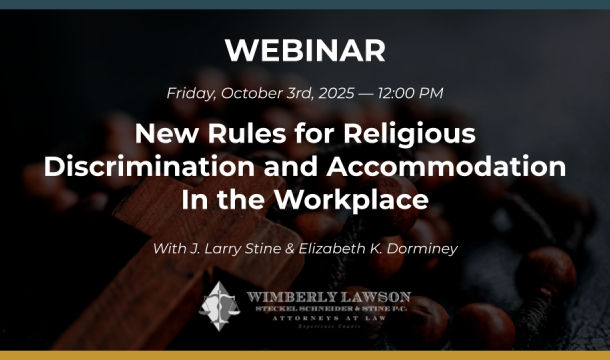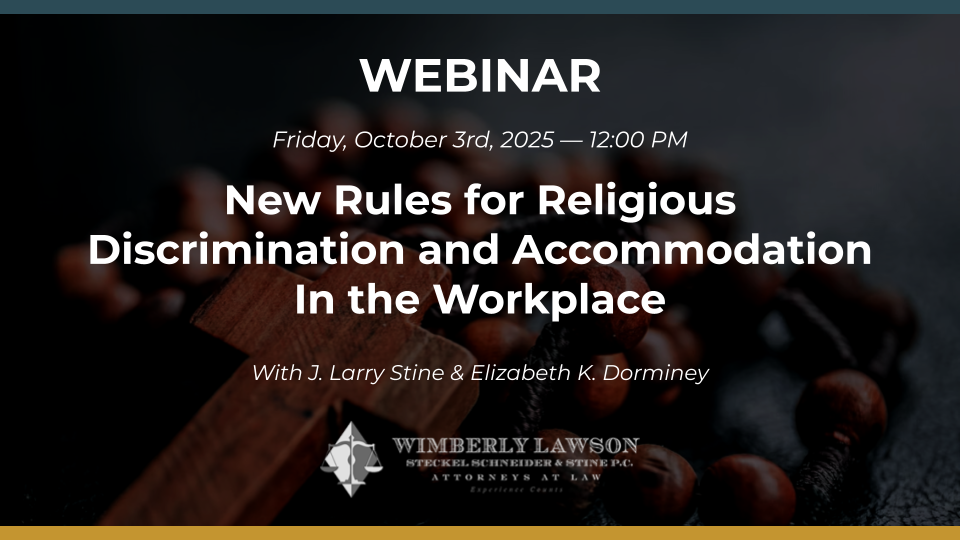Earning a Salary Doesn’t Make You Exempt from Overtime.
One of the greatest employment-law urban myths is that being paid a salary makes you exempt from overtime. That simply isn't true. Under the Fair Labor Standards Act (FLSA), an employee may be exempt if he or she meets certain job duties, is paid on a salary basis, and is paid more than the required threshold salary. On December 1 2016, new Department of Labor regulations will dramatically increase the salary threshold for executive, administrative and professional employees – the EAP exemption - from $455/week ($23,660/year) to $913/week ($47,476/year). Thus, under federal law (some states have different requirements), no employee who earns less than the new threshold salary ($913/week) can even be considered for the EAP exemption.
How will your company deal with currently exempt salaried employees who earn less than $913/week without busting the budget? We have followed this issue closely because we believe it will have a major impact on our clients, and indeed may be one of the most far-reaching changes to the FLSA in several decades. Employers do have options. One, they can increase an employee's salary to $913/week or more, preserving the exemption. Second, they can switch employees to an hourly rate and pay overtime at one-and-a-half times the employee's hourly rate.
There is however a third option. (This is not available in some states, e.g., California.) An employer can pay its non-exempt employees who work overtime a salary less than the $913/week threshold and pay overtime at one-half rate (rather than one-and-one-half rate). In short, the salary is deemed to cover an employee's base wages for all hours worked, including hours over 40 per week. The employer then owes the employee overtime wages equal to ½ his regular rate, rather than the usual 1 ½ times.
Thus, an employer can continue to pay these affected employees the same weekly amount; but, instead of the employee's compensation being pure salary, he or she will get paid a smaller base salary plus the overtime differential.
We have developed an Excel spreadsheet that any employer can use to quickly calculate the correct amount of non-exempt salary-plus-overtime that is equivalent to the formerly exempt employee's weekly salary, based on the number of hours customarily worked each week. Here are some examples:
- A currently exempt employee is being paid $30,000/year ($576/week), and works 50 hours/week. If he is switched to salaried, non-exempt, his new base salary will be $524/week plus overtime pay of $52 per week, for a total of $576/week ($30,000/year).
- A currently exempt employee is being paid $35,000/year ($673/week), and works 45 hours/week. If he is switched to salaried, non-exempt, his new base salary will be $638/week plus overtime pay of $35 per week, for a total of $673/week ($35,000/year).
- A currently exempt employee is being paid $40,000/year ($769/week), and works 60 hours/week. If he is switched to salaried, non-exempt, his new base salary will be $659/week plus overtime pay of $110 per week, for a total of $769/week ($40,000/year).
If the employees in these examples continue to work approximately the same number of hours each week, the new salary plus overtime will keep his or her overall compensation constant.
This tool will not only help you calculate new salaries for your employees, but also help you explain that you're making every effort to ensure that this mandatory conversion does not result in less money in their pocket each week.
Related Content
Get Email Updates
Recent Content

Trump Nominates Appointments to NLRB and EEOC but Policy Changes Likely to Be Delayed

DOL Launches Self-Audit Programs Designed to Help Employers Improve Compliance

DOL Must Release EEO-1 Reports to the Public under Open Records Laws

Current Advice on Active-Shooter Situations

New Policy for Federal Workers and Religious Expressions

